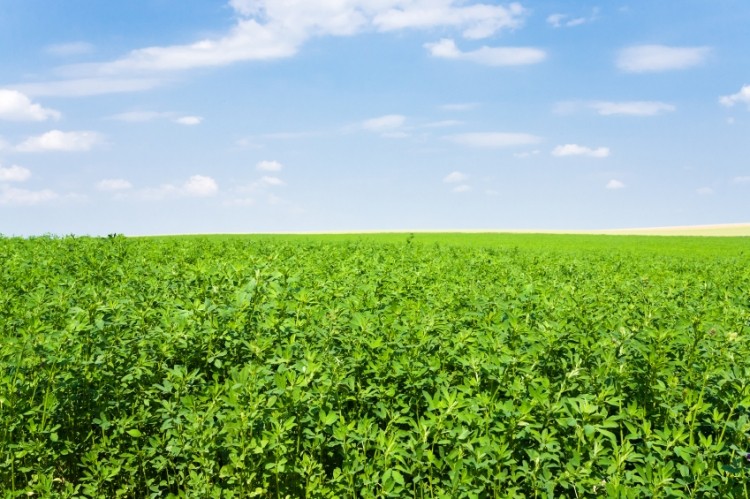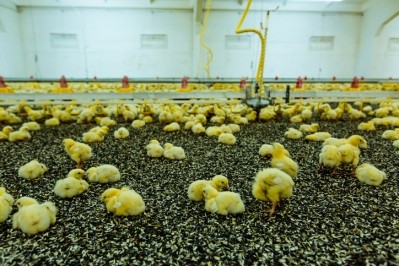Special Edition: Poultry and Pig Gut Health
Study: Plant-derived polysaccharides boost good bacteria in piglets

Chinese researchers looked to assess the effects of alfalfa (Medicago sativa L.) polysaccharides (APS) on the growth performance and intestinal health of piglets.
Their results, which were published in Livestock Science, showed that supplementation of APS up to 800 mg/kg of the piglet diet enhanced gut morphological development and amylase and protease activities in the small intestine, promoted beneficial microbial populations in the large intestine, while also improving growth rate and feed efficiency in a dose-response manner.
Rationale behind research
Weaned piglets, noted the academics, are subjected to a variety of stresses and pathogen infections; such conditions usually result in intestinal dysfunction, lower nutrient digestibility, and reduced growth performance (Kim et al., 2011).
Antibiotics have been used extensively in the swine industry to inhibit intestinal pathogens and improve growth performance but industry is on the hunt for alternative strategies to maintain piglet performance and health due to the abuse of in-feed antibiotics and the emergence of antibiotic-resistant microbes that pose threats to human health (O'Doherty et al., 2010, Petrujki et al., 2017).
The team, based at Shandong Agricultural University, noted that botanical feed additives such as polysaccharide, essential oil and polyphenols are considered optional alternatives to improve performance of piglets, maintain intestinal health or inhibit the pathogens (Cairo et al., 2018, Ken and Bilkei, 2003).
"In recent years, plant-derived polysaccharides have attracted increasing attentions from academic and producer communities owing to their low cytotoxicity to normal healthy cells, with no visible side effects on animals and immunomodulatory activities (Wu et al., 2016).”
Studies, they said, indicated that some polysaccharides improved the growth performance of rabbits, broilers (Guo et al., 2004) and piglets (Yuan et al., 2006).
Alfalfa polysaccharide (APS), which is extracted from the alfalfa plant, was shown to contribute to immune modulation (Deng et al., 2012), as well as antioxidant (Wang et al., 2014), and anti-inflammatory activities (Chen et al., 2012, Zheng et al., 2016). However, the team said no studies have investigated the effects of APS on growth performance of piglet and their optimal inclusion level in the diet.
“We hypothesized that dietary APS can enhance the piglet's growth performance by improving intestinal health.”
Method
A feeding experiment was conducted to ascertain, firstly, the effects of dietary supplementation with APS on growth performance and intestinal health involving the small intestinal morphology, digestive enzymes activities, large intestinal microbial population in piglets, and, secondly, the optimal level of supplementation required in piglets’ diets.
The team allocated 200 piglets, each 35 days old, to five groups. The pigs were fed a basal diet supplemented with 0, 300, 500, 800, or 1200 mg APS /kg diet respectively over 42 days.
Average daily gain (ADG), average daily feed intake (ADFI), feed efficiency (ADG/ADFI, G/F), small intestinal morphology, digestive enzymes activities, and selected large intestinal microbial populations were evaluated.
Findings
Irrespective of supplemental dose, the researchers said they saw that piglets supplemented with APS had greater ADG, but similar ADFI, compared to piglets fed a non-supplemented diet.
In addition, the ADG and G/F increased linearly and quadratically as APS supplementation increased. However, in terms of ADFI, they did not find substantial differences between the groups.
They also noted that supplementation of APS increased the counts of Lactobacillus in the cecum, colon, and digesta, but decreased those of Salmonella and E. coli compared to the control group. The same trend was also observed for rectum samples except for Lactobacillus concentration in piglets supplemented with 300 mg APS/kg diet.
“All of these microorganisms responded quadratically to the dosages of supplemented APS, with Lactobacillus manifesting the highest concentration, and [with the] lowest concentrations of Salmonella and E. coli being observed in piglets fed on 500 mg APS/kg diet."
They saw that piglets supplemented with increasing levels of APS presented higher protease and amylase activities in the small intestine.
They also observed better intestinal morphology development, as indicated by greater villus height and shallower crypt depth, resulting from supplementation of APS to piglets.
"Correspondingly, intestine internal indexes involving digestive enzymes activities, and beneficial microorganism populations were also improved; those may be regarded as direct causes for improved performance (Zong et al., 2018). The present findings verified our hypotheses that APS can enhance the piglets’ intestinal health, and thus contributed to the superior production performance.”
Combining all measured variables, the researchers concluded that the optimum dietary APS concentration would seem to be about 500 mg/kg diet.
Source: Livestock Science
DOI: https://doi.org/10.1016/j.livsci.2019.01.027
Title: Effects of dietary supplementation of alfalfa polysaccharides on growth performance, small intestinal enzyme activities, morphology, and large intestinal selected microbiota of piglets
Authors: Zhang CY, Gan LP, Du MY, Shang QH, Xie YH, Zhang GG















